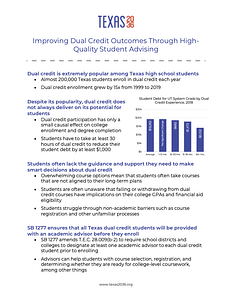
Over the past few decades, dual credit enrollment has exploded in Texas, growing from only 18,000 students in 2000 to more than 200,000 students in 2019. Dual credit—the process in which a student can simultaneously earn high school and college credit in one course—bears immense potential for Texas students. These courses allow students to simultaneously take rigorous coursework, boost their GPAs, and earn credit towards postsecondary degrees and credentials.
However, in Texas, the promise of dual credit has not been consistently realized. Students often take courses that are not aligned to degree pathways, costing valuable time and money when they enter higher education. Further, dual credit participation is deeply inequitable in Texas, with White high school graduates more than twice as likely as Black graduates to have completed a dual credit course.
Student Advising Can Improve Dual Credit Outcomes
- Is the student prepared for college-level coursework?
- Are the courses that the student takes aligned with postsecondary pathways?
- Is the student aware that failing or withdrawing from dual credit courses can have major implications on their college GPA and financial aid eligibility?
- Is the student aware of the resources available to help support their success?
SB 1277 Ensures That All Texas Students Who Take Dual Credit Have an Advisor
SB 1277 would amend the Texas Education Code (Sec. 28009[b-2]) to require that colleges and school districts designate at least one advisor to students before they enroll in dual credit coursework. We believe this is an important step to ensuring that all Texas students have an advisor that can provide them with information, answer their questions, and help them make informed decisions. As dual credit continues to grow in Texas, it is critical that all students have access to an advisor.
